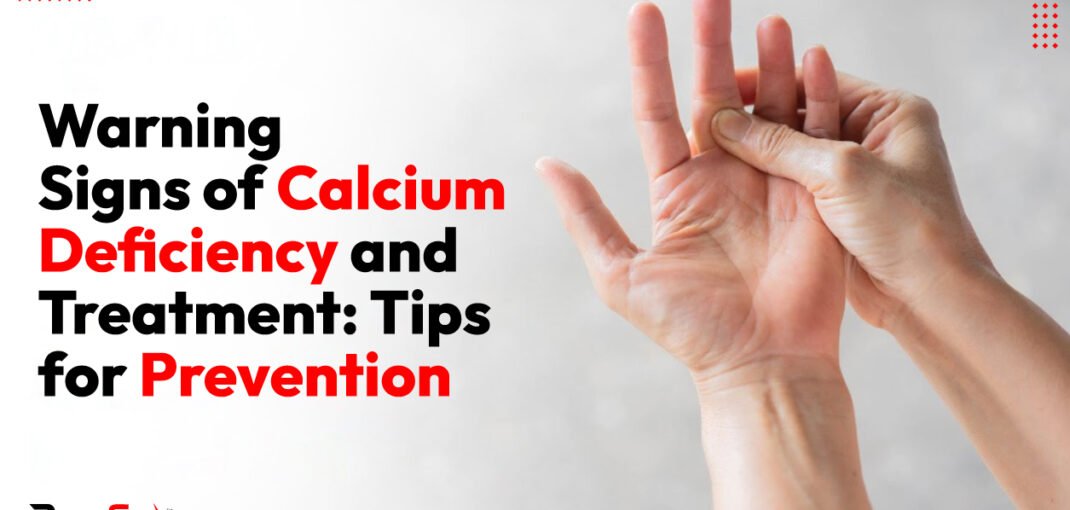Calcium Deficiency: What is It?
Calcium is a mineral that plays a crucial role in keeping your body healthy, especially your bones and teeth. It also supports proper muscle function, helps nerves communicate, and aids blood clotting. When you don’t get enough calcium, your body can suffer from various problems. This condition is known as calcium deficiency or hypocalcemia. Let’s dive into the signs that indicate you might be lacking calcium and explore how you can treat it.
Warning Signs of Calcium Deficiency
Recognizing the early signs of calcium deficiency is important to prevent long-term health issues. Below are some of the most common symptoms:
- Muscle Cramps and Spasms
One of the earliest signs of calcium deficiency is muscle cramps or spasms, particularly in the legs, arms, and back. If you often wake up with painful muscle cramps, it could be a sign that your calcium levels are low.
- Weak and Brittle Nails
Calcium plays a key role in maintaining the strength of nails. If your nails are brittle, break easily, or seem unusually weak, this may be another warning sign.
- Fatigue and Low Energy
Low calcium levels can lead to extreme tiredness, sluggishness, and even feelings of being unwell without any clear cause. Fatigue can make it hard to complete everyday tasks, and you might feel drowsy even after a full night’s sleep.
- Numbness and Tingling
A lack of calcium can cause sensations of numbness and tingling in the hands, feet, and face. This happens because calcium is essential for nerve function, and low levels disrupt normal nerve communication.
- Tooth Decay and Gum Problems
Calcium is vital for healthy teeth. Deficiency can lead to tooth decay, gum problems, and cavities because your body begins to draw calcium from your teeth when your dietary intake is insufficient.
- Bone Pain and Weakness
Since calcium is primarily stored in your bones, a deficiency can cause them to weaken. You may experience pain in your bones, and over time, you may develop conditions like osteoporosis, which makes bones fragile and more likely to break.
- Memory Loss and Confusion
The brain relies on calcium for healthy cognitive functions. In more severe cases, calcium deficiency can cause mental confusion, memory loss, and difficulties in concentration.
- Dry Skin and Hair Loss
When calcium levels drop, your skin can become dry and itchy. Hair thinning or even hair loss can also occur as your body struggles to maintain its normal processes without enough calcium.
Causes of Calcium Deficiency
Several factors can contribute to calcium deficiency, including:
Poor Diet: A diet lacking in calcium-rich foods like dairy products, green leafy vegetables, and fortified foods can lead to low calcium levels.
Vitamin D Deficiency: Vitamin D is essential for calcium absorption in the body. Without enough vitamin D, your body cannot effectively use the calcium you consume.
Certain Medications: Some medications, especially those used for long-term treatment of diseases, can interfere with calcium absorption.
Age: Older adults are more likely to experience calcium deficiency as their bodies absorb less calcium from food.
Hormonal Changes: In women, especially post-menopausal, lower estrogen levels can lead to calcium loss and bone weakening.
How to Treat Calcium Deficiency
If you suspect you have calcium deficiency, it’s essential to act early and seek medical advice. Treatment typically involves making dietary changes, taking supplements, and sometimes medication. Here’s how you can tackle calcium deficiency:
1. Eat Calcium-Rich Foods
The best way to boost your calcium levels is by including more calcium-rich foods in your diet. Examples include:
Dairy Products: Milk, cheese, yogurt
Leafy Greens: Spinach, kale, collard greens
Fortified Foods: Some cereals, orange juice, and plant-based milk are fortified with calcium.
Fish: Sardines and salmon, especially if eaten with bones
2. Take Calcium Supplements
In some cases, diet alone may not be enough to meet your calcium needs. Calcium supplements are a safe and effective way to increase calcium intake, but they should be taken under medical guidance. Overuse of supplements can lead to other health issues, such as kidney stones.
3. Increase Vitamin D Intake
To help your body absorb calcium, ensure you’re getting enough vitamin D. You can obtain vitamin D through exposure to sunlight or by consuming foods such as fatty fish, egg yolks, and fortified foods. In some cases, vitamin D supplements may also be recommended.
4. Exercise Regularly
Weight-bearing exercises like walking, running, or lifting weights can help strengthen bones and improve calcium absorption. Staying physically active is crucial for maintaining bone health, especially as you age.
5. Limit Intake of Caffeine and Alcohol
Both caffeine and alcohol can interfere with your body’s ability to absorb calcium. Try to limit your consumption of these, or ensure you’re balancing them with plenty of calcium-rich foods.
6. Consult a Doctor
If you are experiencing severe symptoms of calcium deficiency or have been diagnosed with conditions such as osteoporosis, it’s important to follow up with your healthcare provider. They may recommend specific treatments, such as prescription medications, that help improve calcium levels and bone health.
Conclusion: Be Proactive About Your Calcium Levels
Calcium deficiency is not something to take lightly. It can impact everything from your bones and teeth to your muscles and nerves. The good news is that it’s preventable and treatable. By paying attention to your diet, getting enough sunlight, staying active, and consulting with a healthcare professional, you can maintain healthy calcium levels and avoid the serious consequences of deficiency.
Always keep in mind that a balanced lifestyle that includes good nutrition and regular check-ups is the key to preventing calcium deficiency. Make sure you’re getting enough calcium every day, and don’t hesitate to seek professional help if you notice any of the warning signs mentioned above.






